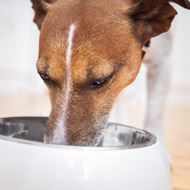Brucella suis-infected meat imported to UK

‘The presence of B suis in imported raw food is a risk to dogs which are fed this meat. It is also a risk to people handling the meat.'
Consignments of meat infected with Brucella suis have been imported to the UK for use in raw pet food, highlighting an additional risk of raw feeding, the APHA has revealed.
The UK was notified last month that some consignments of imported frozen hare meat may have come from B suis-infected hares. Writing in Vet Record, the APHA said the product was bought by a very small number of pet owners and retailers, and a recall has already been undertaken.
B suis was detected in the meat after a dog in the Netherlands tested positive for B suis biovar 1, which is ‘highly pathogenic, causing severe disease in human beings’, according to the European Food Safety Authority (2009). Dutch authorities tested the meat consumed by the dog and identified the same type of B suis.
The hare meat in question originated in Argentina and was initially imported to the Netherlands. Parts of three consignments were later imported from the Netherlands to the UK between November 2016 and May 2017. Some of the meat was also exported to four other EU member states.
Andrew Frost, of the APHA, wrote in Vet Record: ‘The presence of B suis in imported raw food is a risk to dogs which are fed this meat. It is also a risk to people handling the meat and, if the dogs become infected, people and other animals are at risk of contracting B suis from the infected dogs themselves. Infected dogs may shed B suis before clinical signs occur.’
A UK company bought all three consignments and once it became aware of the situation, issued recall letters to the small number of customers involved. Public Health England and the APHA also traced and issued letters to these dog owners, informing them of the risks to humans and animals and advising them to contact their vet.
Veterinary surgeons approached by these clients should be presented with the letter, which explains how to proceed. They are also advised to take appropriate precautions to avoid becoming infected. Clinical signs of B suis, which may take several weeks or months to present, may include spondylitis or lameness. Orchitis, abortion and fever may also be seen.
To date, APHA says there are no confirmed or suspected cases of B suis in people, dogs or other animals in the UK and the company involved has ceased to import the non-EU hare meat.
B suis is reportable in pigs, but not dogs. However, veterinary surgeons are asked to notify the APHA of any positive test results for Brucella.



 The latest
The latest